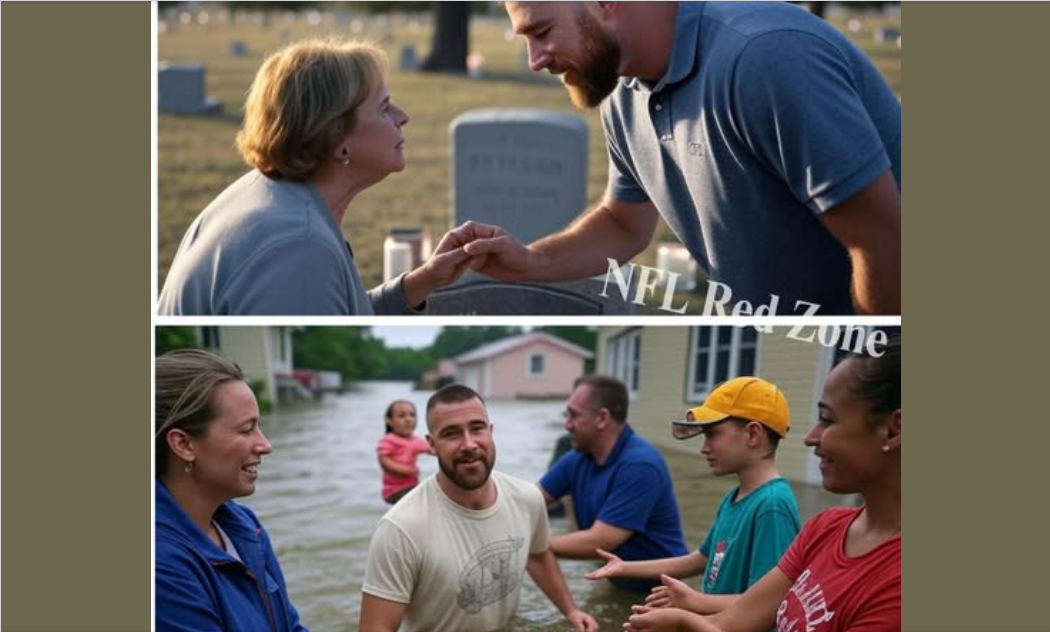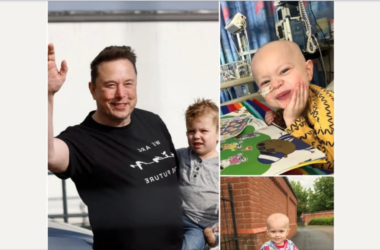It read: “I’ll grow up and protect mom.” The line came from her son’s handwriting before the flood took him. 🕯️🪦

A Light in Grief: Travis Kelce’s Quiet Gift to Texas Families
In the spring of 2025, the floods that ravaged Texas left scars deeper than the mud they deposited. In small towns like Wharton and Bay City, 16 families faced an unimaginable loss: the death of loved ones swept away by the merciless waters. The financial burden of funerals compounded their grief, with costs averaging $7,437 per service, totaling $119,000 across the families. Travis Kelce, moved by their stories, stepped in to cover every cent, easing their burden without seeking recognition. But it was one gravestone, etched with a message from a lost son’s handwriting, that brought a mother to her knees, revealing a gesture so profound it carried her through her darkest days.
The floods had been cruel. In Wharton, the Martinez family lost their 12-year-old son, Noah, who had clung to his mother, Rosa, as they tried to escape their flooding home. Noah, a bright boy who loved drawing and writing stories, was swept away when a current pulled him from her grasp. Rosa was left with nothing but memories and a single notebook, waterlogged but intact, where Noah had scrawled his dreams. One page held a line that broke her heart: “I’ll grow up and protect mom.” The funeral costs loomed like a second tragedy—$8,200 for a simple service and gravestone, money Rosa didn’t have as a single mother working two jobs.
Across Texas, other families faced similar heartbreak. In Bay City, the Johnsons buried their elderly grandmother, who had raised three generations. In Edna, a young couple mourned their toddler, lost in a car overtaken by floodwaters. The average funeral cost, according to 2025 data from the National Funeral Directors Association, was $7,437, covering caskets, services, and burial plots. For these 16 families, the total reached $119,000, a sum that threatened to bankrupt them in their grief. News of their plight reached Travis Kelce, the Kansas City Chiefs tight end known for his generosity, who had already helped rebuild homes and donate raincoats in Texas.
Travis, driven by a belief that no one should face such burdens alone, partnered with a Houston-based nonprofit, Compassion in Crisis, to quietly pay off the funeral costs. He covered everything—caskets, memorial services, burial plots, and gravestones—ensuring each family could honor their loved one with dignity. But Travis wanted to do more than pay bills; he wanted to honor the memories of those lost. Working with the nonprofit, he gathered stories and mementos from the families, hoping to personalize each service. Rosa Martinez shared Noah’s notebook, its pages carefully dried by a volunteer, revealing his handwritten promise to protect his mother.
Travis, touched by Noah’s words, collaborated with a local stonemason to craft a gravestone for the boy. The mason, using a scan of Noah’s notebook, etched the line “I’ll grow up and protect mom” in Noah’s own handwriting, preserving its uneven loops and earnest slant. Below, a small star was carved, a nod to Noah’s love for drawing constellations. The gravestone was installed without fanfare, and Travis asked that his involvement remain anonymous, credited to “a donor” to keep the focus on the families. “It’s about giving them peace,” he told a close friend. “Not about me.”
In late summer, the families gathered for memorial services, their financial burdens lifted. Rosa Martinez, still numb with grief, visited Noah’s grave for the first time. As she traced the etched words—“I’ll grow up and protect mom”—she collapsed, sobbing, overwhelmed by the sight of her son’s handwriting carved in stone. “It’s him,” she whispered, clutching the grass. “It’s my Noah.” A volunteer later explained that an anonymous donor had ensured the message was preserved, a tribute to Noah’s love for her. Rosa felt a spark of solace, as if Noah’s promise lived on, watching over her.
Other families received similar touches. In Bay City, the Johnsons’ grandmother’s gravestone bore her favorite hymn title, suggested by her granddaughter. In Edna, the toddler’s marker included a tiny engraved teddy bear, inspired by a photo of her clutching one. Each gesture, small but deliberate, showed the families their loved ones were remembered. Compassion in Crisis reported that Travis’s $119,000 gift covered all 16 funerals, with surplus funds creating a support group for grieving families. The nonprofit kept his name quiet, as requested, but stories of the gravestones’ personal touches began to spread.
In Wharton, Rosa joined the support group, sharing Noah’s story. She brought his notebook, now preserved in a protective sleeve, and read his words aloud, inspiring others to share their memories. The gravestone became her anchor, a place to talk to Noah, to feel his promise. “He’s still protecting me,” she told the group, her voice steady for the first time in months. The community rallied, with local businesses donating to the support group, moved by the anonymous donor’s compassion.
Word of Travis’s involvement leaked, despite his efforts to stay silent. Social media posts from grateful families sparked admiration, though he deflected praise on his podcast, New Heights. “Folks just need to grieve without stress,” he said, shrugging. “That’s all I wanted.” The gravestone’s story, especially Noah’s message, resonated widely, a testament to the power of personal memory in healing. Rosa began volunteering, helping other mothers navigate loss, carrying Noah’s star-drawing habit into art therapy for kids.
The $119,000 gift lifted a financial weight, but the gravestone messages—especially Noah’s—lifted spirits. They proved that even in grief, a single act of care could echo like a promise kept, guiding families toward light.




